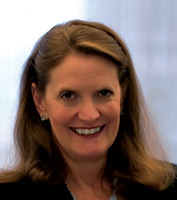
Betting on basics: An investment banker goes public with what appeals to financiers
Named one of "America’s 50 Most Powerful Women" by Fortune magazine, Cristina Morgan has represented her firm on more than 100 IPOs for such familiar names as Adobe, Google, Pixar and Netscape. Recently she was inducted into the W. P. Carey School’s Alumni Hall of Fame. Here, Morgan talks about the role of the investment banker, and weighs in with some advice for individuals interested in making their own stock picks.






